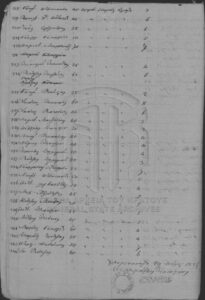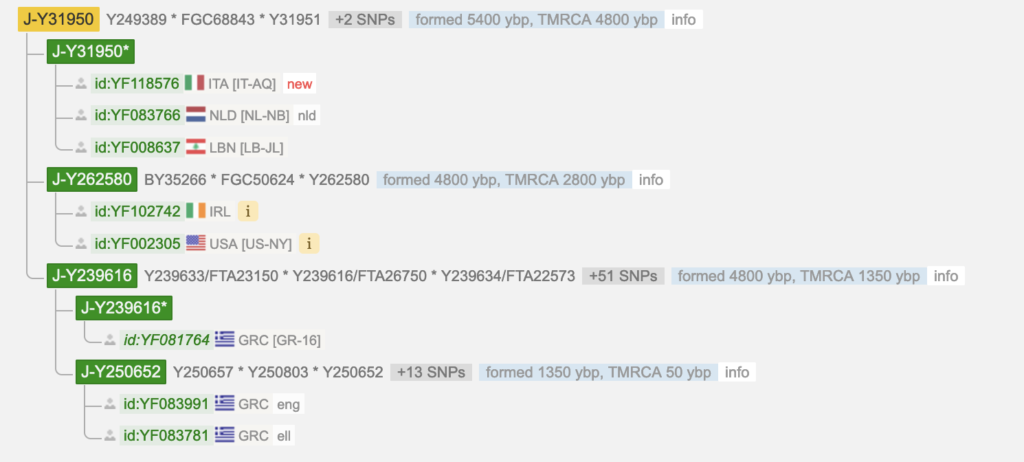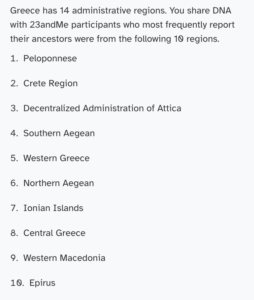Looking into the origins of the Bizannes, Bizanis, De Dear, and Bizanos families. And maybe more.
Last updated: January 7, 2024.
Bizannes is a family name that started in Australia because my grandfather, a Greek refugee from Smyrna (Izmir in modern-day Turkey) invented it. He thought the spelling “Bizannes” would be pronounced more accurately than “Bizanis”, which is what the Greek name (Μπιζάνης) it derives from transliterates to. He changed it to Barnes due to the difficulty of living during Australia’s White Australia era, but when my father turned 18 in 1954 he changed it back to Bizannes along with his two brothers, the elder Leon and the youngest Ion.
What does the name mean? Where does our family originate from? I’ve been searching for this answer since my father died in 2016. If you glance at the 6k+ words on this page, I suppose you could say I’ve got some stories to share.
The short version is no one knows where our surname comes from. However, my family has two theories and a couple of stories of the origin of the Bizanis family.
- My father hypothesises that it originates from the municipality of “Bizani” in northern Greece, famous for a battle in 1913 that freed Northern Greece. As surnames in Greece commonly derived from towns’ people were from, trades or nicknames, it’s a reasonable hypothesis that’s otherwise based on no other evidence other than linguistic similarity and proximity (ie, Greece).
- When visiting Greece, my cousin Alex (son of Lon) met someone and developed the theory that the name originated from Crete due to a nickname for an ancestor who couldn’t say the word for ‘suckle’ in Greek due to a lisp. “Vizaini” would be pronounced “bidzaini”, and thus Bidzainis. (The spelling in Greek of Suckle is “βυζαίνω”.) This is based on a story of a person my cousin met but like my father’s hypothesis, it is based on no other evidence other than a similar sound and likelihood of a nickname a common occurrence in an area we think our family originated from. That said, according to Alex, the person he met claims his grandfather was brothers Michael and Hariton, my grandfather’s father.
- One fact where there is consensus is that my ancestors left their homeland due to an incident with Turks. My father told me there were two brothers and they killed a Turk and had to flee (and by implication explains why one brother ended up in Smyrna and another who became a sailor and moved to Australia). The Cretan variant, talks about this island, which was captured by the Turks in the 17th century from the Venetians, and there were many rebellions after that. The version Alex told me is they left in 1866, when they went to help Arcadi monastery when it was surrounded by Turks trying to over-run it. But they could not get in to help and were too ashamed to return to the village. Pride is a big thing in Crete known for its vendettas. (Blowing up Turks, and being a Greek man within running distance of that explosion, is also a great reason to get the hell out.)
- We know about our family’s origin from Smyrna, that my grandfather owned two hotels, but not much more beyond that.
What’s my opinion? I like a good story but I like it when there is evidence better. Excitingly, it’s a new world now to search for answers. We have DNA tests, records are being put online, and social computing is connecting people and their stories. This is a page with my findings.
My initial assessment
Since I’m building off my family’s previous efforts, let’s start with my father Victor and cousin Alex’s hypotheses:
- Based on my research, the village Παλαιά Ρούματα (Palaia Roumata) that Alex found does have a person called Alexandros in 1870 with the name Μπιζανάκης (Bizanakis) so this is what I assume was the name and not what the historian who reported it in the above-mentioned link said it was (bidzaini). “-akis” is a Cretan way of converting names, so if there was a Bizanis, it’s plausible that someone would change it to Bizanakis. (Linguistically, I’m not as convinced about the other way around, however.)
- Based on my research, in 1920 there was a Ιωάννης Μπιζάνης (Ioannis Bizanis) living in Ioannina, which is the city right by the village of Bizani that I visited (discussed below). So the proximity of this man to the village validates my father’s hypothesis that some people took the name of the village, specifically this one that matches our name in Greek. At the very least, it validates a Bizanis family was located there.
My assessment: there may be truth in both. There is no other place in Greece called Bizani. And while Bizanakis is spelt differently, it’s entirely plausible someone called Bizani was called that later (for example, my Greek name is Ilia and Ilias and my parents called me Iliaki or Iliakis as a term of endearment). Linguistically, it’s more persuasive that the town of Bizani is the origin and a descendant who moved to Crete than the other way around. So this gives us a good direction beyond knowing our family was in Smyrna and some family history link to Crete. I’m still scratching my head about how someone from Ioannina and Crete are linked.
My family history
Let us start with some things my father and my uncles have told me, as well as the roller coaster of history my family emerged from.
My grandfather served in World War I as a translator (likely because he was too young to fight, aged 16 when the war started and language skills were highly valued). After the war, he returned to Smyrna, where his family owned two hotels. But this was not a stable time. He would fight in the Greek forces that tried to take over modern Turkey.
Following the collapse of the Ottoman Empire in WW1, the Greek government occupied Smyrna. The victorious Allies devised a plan to divide up the Ottoman domain and the Greeks, with their irredentism, jumped at the opportunity to protect the Greek speakers outside the borders of Greece and beyond. Smyrna, probably since the 16th century, had become one of the leading cities in this part of the world and one of the biggest of Greek speakers. It was a Greek city outside of Greece, a nation that was a relatively new concept still.
And yet, in the space of a few years, the two-thousand-year history of Greeks being in Asia Minor — the land of Homer and Hippocrates — was to cease. The Greek presence in Asia Minor literally triggered the Turkish War of Independence. Smryna would be ground zero for this war. It’s where the Greek forces first landed, but several years later the war turned around after the Battle of Sakarya, and it would be what would eventually lead to the assault on Smyrna.
My grandfather hid in a cemetery for three days as the successful Turkish militia took the city and would have killed him. Because he knew Italian, he managed to get accepted onto an Italian boat and away from the war zone, along with his mother and sisters. The story of Smyrna is a sobering reminder of reality, and there is a great movie on it (see the trailer below). In short, everyone had to evacuate, most Greeks couldn’t, and it was total chaos. Americans, Italians, French, and others who could get onto their boats sat in the harbour and watched in horror. They could not do anything as they saw a genocide occur in this great city.
They went to Alexandria first, and then to this 100-year-old new state of Greece (which had grown by two-thirds — population and land — just a decade earlier), and which first emerged after 400 years of Ottoman domination. Quick history lesson if you didn’t know — before the Ottomans, there was no Greece, but the Roman state. (They called it Rome, the Roman Empire, Romania; we call it the Byzantine Empire but better is the east Roman Empire.)
My uncle Leon thinks he didn’t stay because he has seen up close the ferocity of the Young Turks and likely did not think Greece stood a chance. (I prefer my version that there were just too many Greeks.) Anyway, he left the women of his family there and got on a 6-month ride on a boat out to the other side of the world, to a new country called Australia . He would later bring his sisters and mother over; be an editor of the first Greek newspaper in Australia that his brother-in-law started and help start the Australian AHEPA, which formed the backbone of the Greek community before the Greek Orthodox Church took over that role. The story of the Bizannes after him will continue someplace else, but back to it: where did this name come from?
LET ME DOCUMENT SOME MORE ORAL HISTORY before I explore what I’ve uncovered.
First, let’s establish the De Dear family. Around the time I was a toddler, they made the connection we are related after an extensive genealogical search. Michael De dear was the fifth Greek in South Australia to be naturalised so is considered one of the first Greeks in Australia (English convicts populated the other states) and has been an interest to historians. He was a sailor which explains how he ended up there. And he was why my grandfather came to Australia after his life was burnt to the ground in Smyrna, in search of him. He had died two years earlier, but I imagine this search in South Australia helped seed the family tree connection that eventuated in the 1980s. We’ll talk about Michael De Dear again.
Secondly, the Nafplioti family In February 2019, a lady in Athens contacted me called Eleni Naypliwtou (her spelling matches Greek letters, better in English as Nafplioti). She had previously connected with my family (Ion and Alex) as a family member Ira remembered her. She is from the family of my paternal grandfather’s mother (Styliana). I found out the following:
- Styliana married my great-grandfather Hariton Bizanis/Bizanou, and he was a widower and had a son from the previous marriage. Styliana (also Stella) herself was previously married to a doctor called Pagonis, with a daughter from that marriage called Elli. She had a sister Olympia as well as two brothers.
- Hariton was a rich man who owned hotels and Styliana came from a cultured family, originally from Crete
- Stella’s father came from Naxos and her mother from Crete.
We now have perspectives from three family groups that were last together 100 and 150+ years ago. Amazing, right?
My first big discovery: the Bizanos families
It’s the year 2020 and I made a new discovery. I DNA matched with a woman in Australia called Lisa Newell who had an ancestor Andreas Bizanos. She never responded to my message, so I look at records and found another family in New York that John Bizanos started. John moved from Smyrna in 1903 but would come back to Smyrna where his son was born in 1921. He managed a hotel in Smyrna; his dad’s name was Hariton. A little too big a coincidence in those facts. I made contact with a descendant from that family (Shawn Bizanos) and in 2023, I just had to make this official and he agreed to a DNA test. We confirmed we are related and it’s within 4 generations.
If my research is correct, it would mean our families last had contact 100 years ago. When I mentioned the discovery to my cousin Alex’s family, I will never forget the realisation they made. As if to recall something they knew but had put it in the dustbins of their memory as they couldn’t make anything from it back then.
Or in other words: bingo!
I reached out to Eleni when I first made the finding and she shared some additional family history
- As the love chemicals were flowing with Hariton and Stella, Stella’s sister Olympia was experiencing the same thing with Hariton’s son. Both sisters wanted to marry a Bizanis. However, the church did not allow this and a family council decided that Stella should proceed as she was older, divorced with one child and Olympia was still young and had life to live still. Olympia became bitter, fled to Monaco with her friends, the Rosenthal family (linked to porcelain), and never married.
Was the source of her bitterness the forbidden love of John Bizanos? Well, check this out. The descendants of John are different from regular Greek immigrants in that they are evangelical Christians (as opposed to Greek Orthodox Christians). Funny that.
Now back to the Melbourne Bizanos. I reached out to Maggie Logan, who managed many accounts and linked to Lisa Newell. Turns out her husband was the son of Katherine Bizanos. As an experienced genealogist, she used a service to compare our DNA and confirmed I am distantly related to her husband. She shared with me some oral family history
- Katherine married a British military officer whom she met in Greece. The Germans had imprisoned her family and they experienced a concentration camp. Her father, Andreas CH Bizanos, died there. She got out and moved to Australia; her brothers stayed in Greece and were a part of the Greek resistance.
- Her eldest brother John opened an English Book Store in Amerikis St, Athens in about 1933. Other brothers were George, Andreas and Zen. Zen wrote a book called Athens guide book in 1949.
- She reached out to her sister-in-law and apparently, there is some memory of a family member being a sailor.
- Katherine’s marriage certificate mentions her deceased father being a hotel keeper in Smyrna.
I still don’t know how Andreas Bizanos fits in, but it can’t be too distant now that I know he also is linked to hotels and Smyrna. Could this be the long-lost brother instead? Did I say bingo already?
So to take stock: we have three family groups with their stories (Bizannes/Bizanis, DeDear, and Nafplioti). And two Bizanos family groups that have no link to anyone except for DNA to my uncle and I, and a story from the Nafplioti that potentially links one of them. What’s the common ancestor?
The linguistic connection. Exploring my father’s hypothesis
We have a copy of some of Haritons marketing collateral, where he referred to himself as Χαρίτου Μπιζάνου (Charitou Bizanou). So if my grandfather said our name was Bizanis and his father wrote it as Bizanou, then we know those two names are connected.
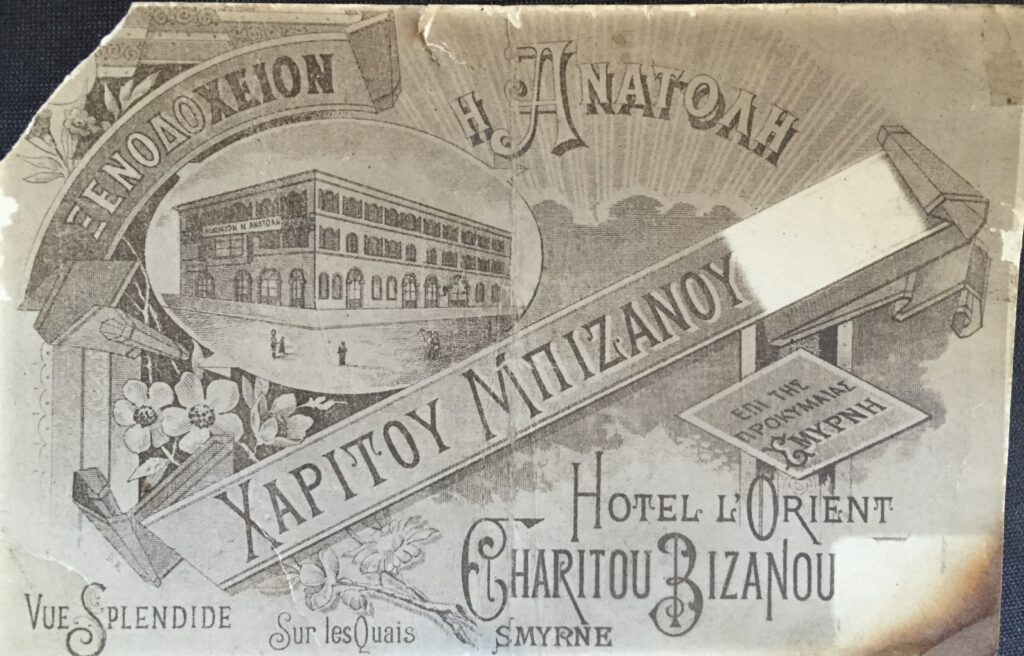
- On the topic of hotels, in July 2023, Shawn Bizanos made me aware that John Bizanos Senior in New York sued the Turks unsuccessfully for burning his hotel down. Not sure what to make of this yet but it gives us an interesting insight into this family where we might find more clues.
My father in his search for an answer looked all over and discovered a village in Nortern Greece. It inspired him to write a fiction book about the life of Hariton and the opening pages has the two brothers killing a Turk and dispersing from the town of Bizani. As my promise to him was to one day get this book out into the world, it was my duty to visit Bizani.
Below is a picture by the Fortess of Bizani that I took and where my father based his hypothesis. You will notice that in English, it’s spelt Bizani but in Greek, it’s actually Bizaniou. This is evidence of Greek grammar in action to show you how two words spelt differently are the same. Hariton spelt it Bizanou, without the i”, which is likely as he was uneducated and the ‘i’ is almost silent. I don’t blame him: I went to Greek school, and this trips me up. This linguistic connection underlies my father’s hypothesis, which is persuasive given the similarity of the letters or rather almost exact replication.
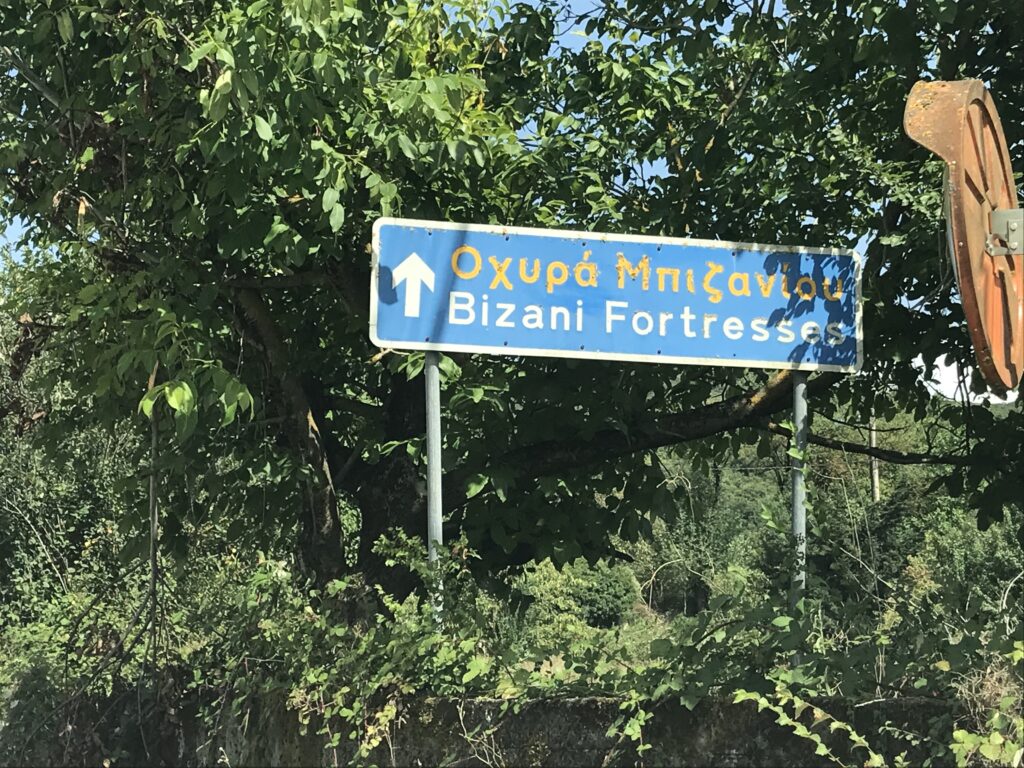
Using purely linguistics and a postcard, this is solid evidence that can guide further investigation.
Exploring DNA to understand what Cretan connection we have
My grandfather Elias would always claim that we were from Crete to my cousin Alex’s family. This is partly what had him go on a search in Crete. However, Hariton died when he was still 8 years old. It makes me question much of the family history Hariton was able to pass on to Elias. Could it be the 8-year-old Elias was so adamant we were from Crete because that’s what his mother identified as?
My father was always skeptical about our Cretan connection as our origin. So the only way to resolve this is to look into DNA.
- I was able to check my DNA on mytrueancestry.com, and it shows a link to Minoan samples from 2000 BCE with a 98% match, meaning we go all the way back on Crete. (It also shows a heavy link to the Roman Empire and Byzantine era, which is not a surprise given my Roman nose but more interestingly a 99% match to the Gothic Thuringii Tribe in 420 AD but more on that another time.)
- If I look at my uncle Leon’s DNA — where I can take out the influence of my pure Greek mother’s blood — you can see below a clear Cretan connection and two other Islands in a similar area (which Naxos is a part of). We also can see 5% is from mainland Greece, in the south, the Peloponnese and south of the Peloponnese (which includes the island of Kythera).
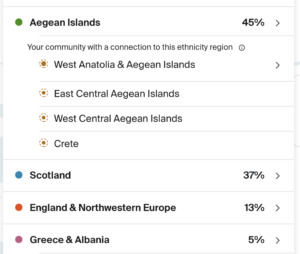
- Since we now know Styliana’s parents were from Naxos and Crete, that explains 50% of my grandfather’s heritage (or in the results of my uncle below, 25%). But we can’t be sure of another 40% of his heritage which island it was and 10% is the Southern Peloponnese. In the years since I got my DNA results, these explanations change as more people get tested — it was saying I was Italian for a long time — so we can’t say it’s final yet. But for now, it implies 20% of Hariton’s heritage is from the Peloponnese and 80% from the Aegean islands. But which side of the family is what? (To put this in context, like how I get 20% Scottish, it means one of Hariton’s grandmother or grandfather is Pelopenese and everyone else Aegean)
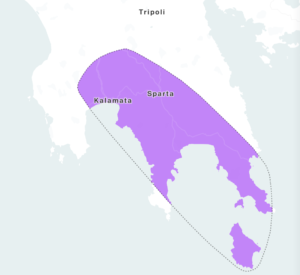
- One answer is “Serigo in the Ionian Islands” which is on Michael De Dears 1883 Australian naturalisation certificate. This is likely Kythira, an island opposite the southeastern tip of the Peloponnese peninsula. (Cerigo was the name when the Venetians controlled it).
- This is interesting for a couple of reasons: it maps to the South Peloponnese region Ancestry identifies on the mainland (It’s only 12.5 nautical miles from the mainland) ; it’s using the name of the Venetians which ended when Napolean put his stake into the Republic’s heart in 1797; and it was a British possession from 1809 until it joined Greece in 1859 (where it retained the Venetian name)
- This explains how Michael got involved with the British and made it to South Australia. His first child was born 1867 in Australia, a new British colony that was only formed 10 years earlier. I’m still trying to find the source I once found to confirm this but he may have even arrived in 1861 (which a historians also says) which also invalidates the story about the aArcadi monastery as it was burned down in 1866.
- There is a big Kythirean community in Australia, but there are so many, my father used to question that people came from there: “they wouldn’t all fit!”. His hypothesis is it was easy for someone from the mainland to escape the Ottomans and get a British ticket out of there, hence why so many people have a link there. My uncle Leon also thinks it’s likely he lied about this because when he landed in Australia, if he was to say he was from Greece or Turkey, he would have been shipped back.
- Now that the DNA matches, we can accept a record of John Bizanos as evidence. On his passport application, he says his father Hariton was from Crete. As this is now at 95% probable this is the “long lost brother” this now does two things: it confirms the family oral history we originate from Crete and matches to the DNA. But why does it conflict with his brother’s birth location 200 km away?
Looking at other family DNA assessments may help answer this question.
- Lisa Newell’s DNA, which is how I discovered the Bizanos connection, gives us some direction. Of her 5% Greek, only 1% is from the Aegean, and 4% is from the mainland.
- Yet this gets murky with the New Yorkers. Compared to my uncle’s 50% Greek and Shawn Bizanos’s 25%, Shawn’s is 19% to Lon’s 45% and 5% and 6% respectively from the mainland. This suggests John Bizanos’s mother was also from the Aegean so we can’t deduce much here.
- If we look at Hariton’s brother, we can get another picture. Leah De Dear comes up as a match, and her Greek ancestry is 5% Aegean and 3% the mainland. Nick De Dear is an even closer match to my great uncle, which has him at 2% Aegean islands and 2% the mainland. A relative of theirs Debra Klas is 6% Aegean island only and no mainland. This supports that Hariton’s father was about equal mainland and Aegean islands in ancestry but with just a bit more for the islands.
- I expect we will find this answer once we work out how Andreas Bizanos fits into the tree. If we assume John is the first son of Hariton, then who was Andreas and his father? Were they both from Smyrna as well or an island?
- There are other people I’ve looked at; just like above, it is inconclusive. But I think there is reason to support that the paternal lineage of the Bizanis before it moved to Smyrna, is from the Greek mainland (which by definition due to the DNA testing, includes the island of Kythera) but it’s distant and not in my known family tree.
- If we accept the work of historian George Kanarakis, Michael de Dear’s father was from Kythera and his mother from Crete. This view is supported by the DNA testing above.
- As more men get their DNA tested, and in my lifetime, I’m sure this will be answered definitively by the Y-Chromosone so it’s only a matter of time before we have a full map of the Bizanis paternal lineage.
In conclusion, Crete is certain but not the sole possibility. Crete is less likely the case in the years before 1800 and for the male lineage of the family, with Kythera very likely. As for how many generations in Kythera however, we have no family knowledge so will rely on DNA testing to uncover this.
My second big discovery: the Mani connection
I found a record of someone living in 1844 with the name Δημήτριος Μπιζάνης (Demetrios Bizanis) in the south of Greece (in Amfeias, near Kalamata) and later central Greece (Thebes). It puts his birth as 1809. Michael de Dear has a record saying his father was “Demetrios”. According to my cousin Alex, this man he met in Crete mentioned a Demetrius who was brothers with our great grandfather and his grandfather.
- There’s another record in 1856 for another Demetrios Bizanis but in a different part of Greece, and this time he is married with three family members. It suggests he was born in 1816.
- Michael De Dear’s Australian records say he was born in 1835, meaning Demetrius was either 26 or 19 which would align. (We don’t know when Hariton was born but I have the impression he was older.)
- Greece’s revolution ended in 1828 so a young Demetrios likely moved around as the Greek state developed.
Another discovery in the most unlikely of places. A wedding. Elvie, a Greek friend I met in California married in early 2023 (originally from Boston). I spoke to Elvie’s father who is proudly from the Mani Peninsula and a famous family (Stephanopoulos) at that which we talked about due to my interest in history. When I said my name and he told me his mother’s surname, we gasped in turn. They are different but incredibly close. His family in Greek is Μπιτσάνης (Bitsanis) versus my family’s name of Μπιζάνης (Bizanis).
- I showed him the record of Demetrios Bizanis and he recognised the town as one up from his mothers.
- I went back and looked at the original record and struggled to see how they worked out the handwriting. The image below is of the 1856 Theban record: you tell me if you can make it out (Item 228). This made me think there is a chance once upon a time it was misspelled as “ζ” versus “τσ” as cursive Greek handwriting has them look incredibly similar especially if bunched together. But Greek written records were rare between 1453-1821 unless it was the Church, so before 1821, it is likely the only existing records were from Turkish Islamic script used for tax records. Based on these tax records that I’ve seen when looking into my mother’s village, they group families by the head of the family which gives us the insight here that names had to be changed if males shared a name in the same village to avoid confusion. These observations do not conclusively state anything but show how names starting with “Biz” and “Bits” could be related.
- But there’s more: I’ve found Bitzanis (Μπιτζάνης) which is even closer and Botzanis (Μποτζάνης) which again is a one-letter evolution. These names are all too similar to think they started independently and a slight evolution only separates them.
- This then leads to the question of why that would happen. I’m still wondering about this but misspellings, differentiation on tax records, and disassociation with a family due to an incident are all candidates.
- Since writing this, I’ve been told in Greece, especially the Mani surnames changed very often up to the extent that two brothers would have a different surname. They did this to differentiate the family branches
- If my hypothesis above is correct, this creates a new scenario: there was a Bitsanis family in the Mani peninsula, and for a deliberate or unintentional reason, there was a misspelling, and it became Bizanis (or even the other way around). If this is the origin of my paternal lineage, it helps make more sense why other Aegean islands are in our blood (for historical reasons, I’ll explain later). It also opens the door to other regions with similar spellings. But ultimately, it suggests Hariton’s dad, who I suspect is called Demetrios, was 40% from the Peloponnese and the rest of the islands most likely Crete. Or rather, one of his parents was mostly from the Peloponnese and another from an Aegean island.
But these theories can get you only so far and we colour them with our personal preferences which I don’t want to repeat. Objective evidence is what I want, which is why I’ve done some other types of DNA testing. And I’m glad I did. I’m about to describe the strongest evidence I’ve found to answer the question of where my family originated from before the 19th century.
It turns out, my Y-Chromosome is matching with someone who is Greek (more than anyone else) on the DNA testing site Y-full. And get ready for it: he’s from the South of Greece near Kalamata (the Mani peninsula), but whose name derives from something different.
This means two things: whatever surname my ancestors had in the 1800s was likely not that 1000 years earlier and this Mani connection is now objectively solid. We have a common ancestor, most likely, 1350 years ago, which would mean about 45-53 generations. This potentially implies the Bizanis, and whatever they were called before that, have been Greek speakers for at least this long, which sounds about right as this is when the Roman Empire became primarily Greek-speaking.
- There is a local legend that his family or village was a pirate village. This was a common occupation of Greeks from that part of modern Greece during the 1453-1820 Ottoman occupation. The Mani peninsula was the one place free of Ottoman rule.
- He believes his ancestors were autochthonous to the region based on his research. He’s done research as far back as 1000 years and has no link to the Epirus region
- I’ve yet to see a match with his family, at least with his paternal aunt, on Ancestry so this suggests we are connected several hundred years more than the present as Ancestry uses autosomal and this dilutes over time
- I submitted a bunch of common names matching my uncle and he identified one as from the Outer Mani region. The surname is Baveas. The relation looks to be 5-8th cousin and I identified a Metaxas Baveas born 1876 in Kythera, and who’s family goes back to 1688 on the island. I match another man with Metaxas and Kythera in his tree with everyone else. Michael De Dear may have actually been telling the truth on his naturalisation where we get this fact from
- By the way, all the men who share my Y-Chromosome subclade are below. The top result in my son and the man in question is result number three. I was under the impression that the Y-Chromosone passes down from father to son unchanged hence my research interest in this, but I’ve learned with my data there are slight variations (which makes sense and hello evolution). I’m still not sure how to read this in terms of generations and does not necessarily mean the 1350 estimate is correct as it’s only based on the current data.

This means we have four pieces of evidence that all tell a similar story.
-
-
There is a Greek government record for a village near Kalamata/the Mani peninsula
-
I matched a man with DNA with my Y-Chromosome from the Mani who can trace his family to 1000 years.
-
A family whose name is similar and from the same location as the government record is from the Mani, and
-
My Ancestry DNA results and 23aandme results say we have a strong Southern Peloponnese link (which is where the Mani and Kythera is).
-
The above objective evidence suggests that the Bizanis originate in the same part of Greece: the Mani peninsula (and possibly the nearby Kythera we’ve discussed earlier).
So if Bitsanis truly is connected to us…then what the hell does Bitsani mean?! Or a Bitzanis and now a Botzanis?! In fact, what could Bizani mean What’s the common word that all derive from? So as we wait for more DNA results and records to go online, let’s hold on this and get back to the north of Greece and try to work out how this unique village (and fort and mountain range) got its name. And even if we don’t find anything, I just want to say there is now officially some family history there as it’s where I proposed to my wife. Yes, that’s right — on Mount Bizani.
Bizani: the word.
The fort of Bizani has a US Congress report in 1913 calls it Fort Bezhani and the historian Allan Brooks in 2013 says Fort Bizani is the Greek name for Fort Bijan. If you’re interested, in 1913 there was a major battle over this fortress (hence the interest by the US government), and it’s a major reason how Greece acquired the North that we know it as (ie, Greece the country grew by 2/3!). Control of Bizani meant control of the city of Ioannina beneath it.
But that’s not all! Bizani appears in other parts of the world. And some of my thoughts based on my research into Fort Bizani:
-
- In Eastern Turkey, in the Kurdish-dominated area of Van, has a town called Bizani. A well and a stream in the Balochistan province of Pakistan, too.
- If you type “Bizani” into Google Translate, the Artificial Intelligence engine thinks it’s an Uzbek word and other times a Kurdish (Kurmanji) word. Kurmanji is a Kurdish dialect from the 16th century, a language that derives from Farsi. Uzbek is a Turkish language.
- The Greek alphabet does not have a letter for “B”, so the sound needs to be made with two letters: “M” and “P” so “MP” is how Greeks made an English “B” sound. However, Turkish, Kurdish and Uzbek have a “B” letter and sound. Suggesting “Bizani” or Μπιζάνη is not a native Greek word and may have been introduced during the Ottoman occupation.
- Bijan or Bizhan, is a name that derives from one of the main Iranian heroes in the Shahnameh, the national epic of Greater Iran. It’s a Persian name for “Hero”
- The speakers of Hassaniyya, also called Bizan (Bizani for singular) are an Arab Bedouin tribe that originated from Yemen in the 13th century and that represent millions of speakers of this dialect today (Mauritania alone is 2.5m)
- In Kurdish, and according to Wikipedia, the word zanîn (“to know”) is also in a different tense bízanî
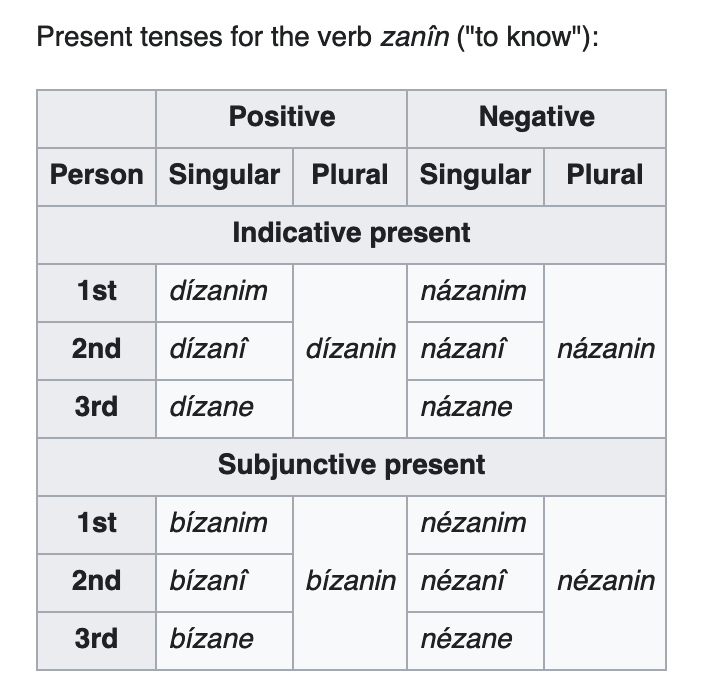
Concluding thoughts
Bizannes is the name Bizanis, which is related to the name Bizanos. And also Bizanou or Bizaniou. And potentially also Bizanakis and Bitsanis. It is the predecessor name of the “De Dear” family name. And before all that, there were some pirates. These families from New York (and now Florida), Victoria, South Australia, New South Wales (and now California), and many in Greece derive origin from these names — where does the name come from?
Despite being my father’s son, I have to say, his hypothesis is the most convincing as the origin linguistically. It’s the same spelling and its declensions are what Hariton used which may also explain the Bizanos variation John Bizanos adopted (ie, it came from Bizaniou). There are too many people with similar surnames so an analysis of all variants is needed to find the base word. The word Bizani or variant does not equate to any Greek word and is unusual in spelling, implying its origin is not Greek. There are no other geographic areas in Greece called Bizani (and this famous battle may explain why there are so many streets in Greece with our name).
According to what I’ve read from two historians, the mountain range surrounding Ioannina from the south is called Bizani (current maps don’t mention the mountain range’s name). So this may be where the Fort got its name. Either way, if the Ottomans named the mountain range or the Fort, it’s not surprising that it’s a Kurdish word or legend associated with Persian culture. This is because the Kurds were a big part of the Ottoman forces and the language is more similar to Farsi than Turkish. The Shahnameh is a love story of Bijan capturing a beautiful girl and winning a great battle against her father. So to call a Fort after this hero is not out there.
I’m more impressed by my other chance finding: Kurdish grammar. You want the high ground when it comes to military tactics. One reason you want it is for a defensive position so that you are aware of everything happening from a distance. If you were a Kurdish commander and were to give a name to the mountain range that surrounds Ioannina and/or the fort that sits on it, don’t you think “to know” (or “Bizani”) makes a lot of sense?
This makes for an interesting hypothesis of what Bizanis, the word, means. But do I think my paternal lineage originated from that area? Well, DNA testing with Ancestry does not support northern Greece. But 23andme which has been around longer and may have more data, seems to think there is a weak link. (Ioannina is in Epirus.)
And let’s not forget there is a Greek record of someone with our name there. So it’s not off the table. (It could also be a coincidence.)
What the DNA is more strongly suggesting is southern Greece. Elvies father, whose mother is Bitsanis, would tell me the Mani peninsula has close ties with Crete, with almost a friendly rivalry due to their history and similar cultures. Further, Crete, Kytheria, Naxos, and the Peloponnese were Venetian possessions, which would have enabled the movement of people between those areas. (This likely explains why Ancestry previously thought I was 17% from Italy and 23andme still has me at 1.5% still) As horrible living under Ottoman rule would have been with the taxes, child levies, and slavery — living under the Venetians was not great either.
The Venetians would recruit Greek men to perform the dangerous role of rowing in their Gallery boats. Dangerous as that was, a sea connection gives us a solid reason that can explain why the Bizanis were bouncing around in different areas. It gives us a reason to link people in the Peloponnese, Crete and the Aegean islands. It also gives us a link to Ioannina, as it was a centre for the Greek enlightenment, enabled by the Greek seafarers with their connections to Italy, especially Venice.
So with my best lisp impression, I’m going to say this as heroically and all knowingly as an enlightened sailor can say: “To be continued…”
